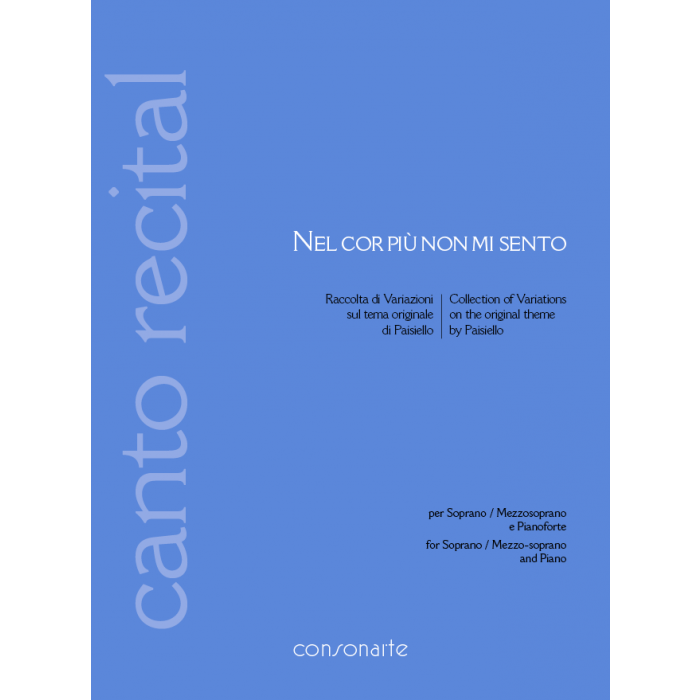Nel cor più non mi sento
Nel cor più non mi sento
Collection of Variations
on the original theme by Paisiello
for Soprano / Mezzo-soprano and Piano
Authors: Giovanni Paisiello, Francesco Morlacchi,
Angelica Catalani, Maria Malibran
Poetry Giuseppe Palomba
Score editing Alessandro Monga
Jean-François Lesueur described La molinara, the title that under popular pressure replaced the
original L’amor contrastato, first performed in the autumn of 1788 at the Teatro dei Fiorentini in
Naples, as “this masterpiece among the many masterpieces of Paisiello”. Even today the score stands out
in the repertoire of this composer from Taranto for its inventive joyfulness and Neapolitan wit, more brilliant and
sceptical than usual, that characterise the much-ado-about-nothing of Rachelina’s entanglements.
Paisiello
hit the mark and his apparently simple little tune, Nel cor più non mi sento, to be sung “sotto
voce assai” was destined to become very famous indeed: Ludwig van Beethoven, Niccolò Paganini,
Alessandro Rolla, Giovanni Bottesini, Mauro Giuliani, are just a few of the many composers seduced by the
Paisiello's invention, who wrote series of Variations based on the celeber theme.
The present collection
contains three series of 'virtuoso' Variations for voice with piano accompaniment:
- Nel cor più non mi sento Theme and
two Variations
G major
Andantino
Variazione I
Variazione II
- Nel cor più non mi sento Theme and six Variations
G major
Andante
Variazione I
Variazione II
Variazione III
Variazione IV
Variazione V
Variazione VI - Nel cor più non mi sento Theme and five Variations
D major
Andante
Variazione I
Variazione II
Variazione III
Variazione IV
Variazione V
- Vocal difficulty level: ❍❍/❍❍❍
- Vocal extension
Theme and two Variations in G major: F♯3 - A4
Theme and six Variations in G major: D3 - C5
Theme and five Variations in D major: A2 - A4
- Piano difficulty level: ❍
| Publisher | © 2016 Consonarte |
|---|---|
| Catalogue No. | C704 |
| Format | Paper |
| Language | Italian / English |
| Pages | 44 |
| Dimensions | 310mm x 230mm |
| Score Weight | 200gr |
| ISMN | 979-0-708148-03-6 |
A Hit for Prime Donne
Jean-François Lesueur described La molinara, the title that under popular pressure replaced the original L’amor contrastato first performed in the autumn of 1788 at the Teatro dei Fiorentini in Naples, as “this masterpiece among the many masterpieces of Paisiello. Even today the score stands out in the repertoire of this composer from Taranto for its inventive joyfulness and Neapolitan wit, more brilliant and sceptical than usual, characterizing the much-ado-about-nothing of Rachelina’s entanglements.“ […]
This opera without a finale delighted not only Lesueur but also Haydn, who in 1790 chose to direct it at Esterhaza, and it also found favour with Beethoven, who took the theme of the extraordinary quartet “Quanto è bello l’amor contadino” to compose a series of nine variations for pianoforte, which was to be followed not long after by the series of six variations on the theme of the duet “Nel cor più non mi sento”. […] Paisiello hit the mark and his apparently simple little tune, to be sung sotto voce assai, was destined to become famous, proliferating in a truly endless series of “themes and variations.
Although this is not the place for a complete list of the authors of instrumental variations on “Nel cor più non mi sento”, it is not easy to resist the temptation to cite at least the violinists Niccolò Paganini, Alessandro Rolla, Camillo Sivori; the double bass player Giovanni Bottesini; the guitarists Mauro Giuliani and Ferdinando Sor, leaving aside the many other musicians, far from unknown, who took advantage of Paisiello’s captivating tune to write their own more or less brilliant compositions.
Similarly, it would be difficult to give an exhaustive list of the singers who, starting with Giuseppe Palomba’s lines of verse were able to display throughout the 19th century their own individual and inventive ornamentation. However, among those that come to mind are Velluti (of whose Variations Meyerbeer has left a record), Giuditta Grisi, Henriette Sontag, Marietta Alboni, Barbara Marchisio. And above all, the three glorious prime donne whose names were associated especially closely with “Nel cor più mi non sento”: Angelica Catalani (1780-1849), who performed several versions, making it one of the guaranteed highlights of her recitals; Isabella Colbran (1784-1845), whose name appears on the manuscript of six Variations composed by the Perugian Francesco Morlacchi (these, in turn, being the source of numerous copies and reworkings); and Maria Malibran (1808-1836), author of a particularly acrobatic series of five Variations, which were not only taken up, after her premature death, by her celebrated fellow singers (as well as her sister Pauline Viardot) but was unexpectedly destined to be often performed in the “music lesson scene” in Rossini’s Il Barbiere di Siviglia. […]
The Publisher in collaboration with Sergio Ragni and Davide Verga
Extract from the presentation essay written for Nel cor più non mi sento –
Collection of Variations on the original theme by Paisiello
26 May 2016 © Consonarte


